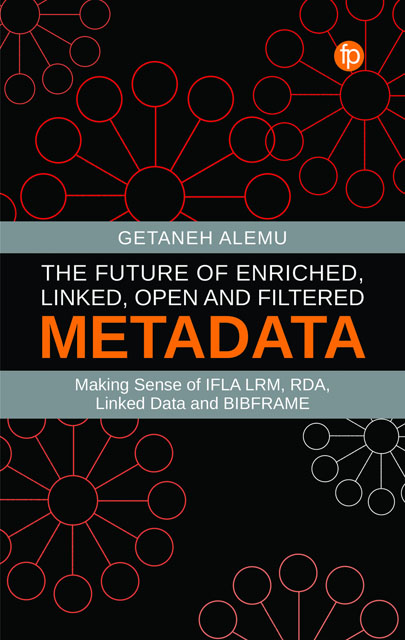 The Future of Enriched, Linked, Open and Filtered Metadata
The Future of Enriched, Linked, Open and Filtered Metadata Book contents
- Frontmatter
- Contents
- Figures
- Tables
- Code snippets
- About the Author
- Preface
- Acknowledgements
- Abbreviations
- 1 Introduction to Metadata
- 2 Metadata Strategies and Quality Indicators
- 3 Metadata Use Cases
- 4 Contemporary Metadata Principles
- 5 Enriched and Linked Metadata
- 6 Open Metadata
- 7 Filtered Metadata
- 8 FRBR, LRM and the Notion of Work
- 9 Resource Description and Access (RDA)
- 10 BIBFRAME: A New Metadata Framework
- 11 Crowdsourcing and User-Generated Metadata
- References
- Index
8 - FRBR, LRM and the Notion of Work
Published online by Cambridge University Press: 18 November 2022
- Frontmatter
- Contents
- Figures
- Tables
- Code snippets
- About the Author
- Preface
- Acknowledgements
- Abbreviations
- 1 Introduction to Metadata
- 2 Metadata Strategies and Quality Indicators
- 3 Metadata Use Cases
- 4 Contemporary Metadata Principles
- 5 Enriched and Linked Metadata
- 6 Open Metadata
- 7 Filtered Metadata
- 8 FRBR, LRM and the Notion of Work
- 9 Resource Description and Access (RDA)
- 10 BIBFRAME: A New Metadata Framework
- 11 Crowdsourcing and User-Generated Metadata
- References
- Index
Summary
Overview
In this chapter, IFLA's Library Reference Model (IFLALRM), one of IFLA's emerging standards thatconsolidates previous standards of FRBR, FRAD andFRSAD, is discussed along with its entities andattributes. The difference between FRBR and LRM isexplained. The concept of Work is also discussed inthis section. Libraries and archives move fromrule-based cataloguing to a framework andmodel-based description. Frameworks and models areabstract representations with expressive power. FRBRand LRM follow more detailed recommendations andinstructions such as RDA. From RDA come specificcataloguing policies and application profiles and,finally, from application profiles, specifictemplates and workflows can be prepared to supportdayto-day cataloguing. LRM is a conceptual model andthus can be adapted based on institutionalrequirements. Hence, instead of being a singleuniversal standard, it provides a framework bydefining high-level entities – consolidating the oldcataloguing rules-based approach to a framework,from records to data, silos to metadatainteroperability.
The progression of the FRBR family of standards is asfollows:
1 FRBR (1997) Functional Requirements forBibliographic Records (FRBR – 1997)
2 Functional Requirements for Authority Data(FRAD – 2009)
3 Functional Requirements for Subject AuthorityData (FRSAD – 2010)
4 Library Reference Model (LRM – 2017).
Svenonius (2000, ix) notes that:
instant electronic access to digital informationis the single most distinguishing attribute of theinformation age. The elaborate retrievalmechanisms that support such access are a productof technology. But technology alone is not enough.The effectiveness of a system for accessinginformation is a direct function of theintelligence put into organising it. Just as thepractical science of engineering is undergirded bytheoretical physics, so too the design of systemsfor organising information rests on anintellectual foundation.
Put simply, what may appear to be a pedanticapplication of rules in library cataloguing isunderpinned by foundational principles that go backto the history of libraries themselves. This work oflaying foundational principles was pioneered byCutter, Panizzi, Ranganathan and Lubetzky(Svenonius, 2000). This work also further elaboratedand expanded with computers and the web. Thedevelopment of the Functional Requirements forBibliographic Records (FRBR) model and itssubsequent replacement by the IFLA Library ReferenceModel (LRM) is a keystone of current librarycataloguing and metadata.
- Type
- Chapter
- Information
- The Future of Enriched, Linked, Open and Filtered MetadataMaking Sense of IFLA LRM, RDA, Linked Data andBIBFRAME, pp. 165 - 196Publisher: FacetPrint publication year: 2022


